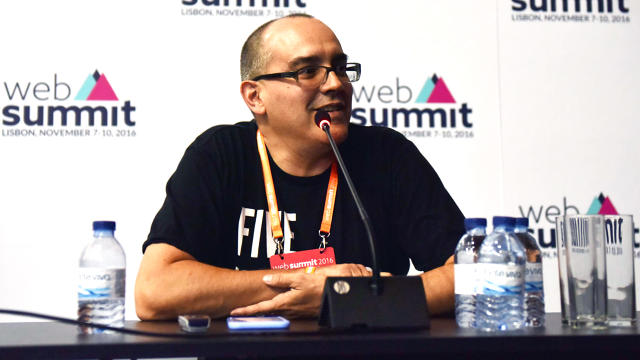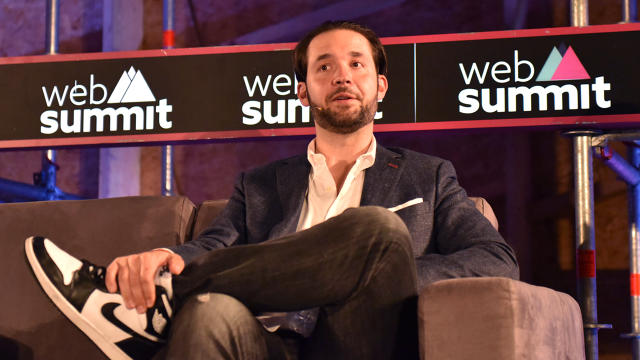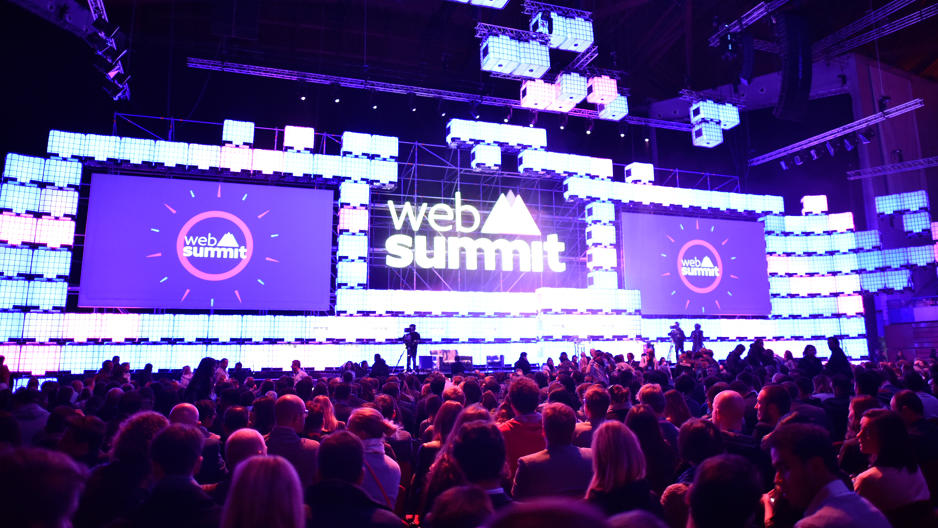Tech Leaders At Web Summit Scramble To Chart A Course In Trump’s America
It’s November 9th, 2016, and while I am attending the same tech conference in Lisbon, Portugal as I had the previous two days, it seems like a completely different event. The enthusiastic gathering of about 50,000 geeks and tech titans who’d previously walked gleefully through the four conference buildings, introducing themselves to anyone within earshot, and drank local beer well before the noon hour, turned to a somber and eerie hush on this post-election morning. Conversations became more muted, more reserved, and the many that were held in foreign languages were peppered with English words like “America,” “Clinton,” and “Trump.”
The election is an ocean away, and while most attendees of the event don’t call the United States home, there’s a universal understanding that all will be directly affected in one way or another.

“These are conferences that attract people who are very excited about building the future, and generally very optimistic, and it feels less so,” Reddit cofounder Alexis Ohanian tells me, as we struggle to stick to the topics I’d originally planned to ask about. “Everyone feels a little uneasy.”
One of the first talks of the day was dedicated to discussing the fallout of the election, and as weary-looking panelists quickly admitted, they were expecting a celebratory conversation about feminism and social progress. Instead, panelist Owen Jones, an award-winning journalist from the U.K. who is still struggling to come to grips with Brexit, assures the crowd he is not mincing words when he considers the election of Donald Trump to be the worst thing to happen to the Western world since the end of World War II.
The political talk didn’t end with the few panels of the conference that were actually dedicated to politics. The big, orange elephant in the room seeped into conversations, both offstage and on. Some tried to offer calming words of optimism and reassurance, others tried to tie technology into an explanation of what had happened, some failed to contain their emotions and instead took to screaming profanities through the speaker system of the MEO Arena stadium.
“If you’re not fucking pissed right now, what is wrong with you?” shouted Dave McClure, the founder of Silicon Valley accelerator 500 Startups. The original topic of conversation, Is Ego the Biggest Reason for Failure? was not consciously intended to reference the president-elect, but on this gloomy morning McClure can’t help himself. “It’s our duty and our responsibility as entrepreneurs, as citizens of the fucking world, to make sure that shit does not happen. This shit will not stand, and you’ve got to fight for your rights and…stand the fuck up!” continued McClure, standing from his chair and motioning for the rest of the audience to do the same.
As the day progressed, moderators seemed better able to focus the conversation back to those topics that were promised on the official conference schedule. A common segue asked those standing on the stage of the keynote stadium to consider technology’s role in the outcome, and whether those in the room should feel any sense of personal responsibility.
After all, the attendees at the Web Summit conference represent the liberal elite most loathed by the people who put the controversial real estate mogul and reality TV star into the White House in the first place. They are the ones for whom the new economy is working. They are here in an echo chamber of progressive ideas about the changing nature of technology and society, mingling with thousands of like-minded individuals.

Meanwhile, on the other side of the Atlantic, those who cast their ballots for the Republican candidate are in a technological echo chamber of their own, enabled by social media tools that allow them to amplify and become further entrenched in their own viewpoints, suggested many here in Lisbon.
Ohanian, for one, doesn’t think there’s much to the argument that social media and technology is to blame for the rise of Donald Trump.
“Social media was lauded for the Arab Spring. Even back then you will find quotes from me saying ‘that’s ludicrous, Twitter and Facebook don’t overthrow governments, people do,’ and celebrating those tools is kind of like celebrating church meetings, and mailing lists during the civil rights movement,” he says. “Those things absolutely enable, they absolutely amplify it, but they aren’t the reason why they happen.”
Ohanian, who proudly remembers his mother’s swearing-in ceremony when she officially became an American citizen, is afraid a Trump presidency threatens one of America’s biggest advantages in the global economy.

“As a nation, that has always been one of our unfair advantages, that we have attracted [the world’s best talent],” he says. He believes some of Trump’s policies threaten to send that talent back to their home countries, while others will discourage new talent from arriving. “With an industry that’s been as successful as tech has been in terms of creating value and creating jobs and changing the world,” he says, “I would hope we should want to, as a country, stay as competitive in that as we can.”
During this election cycle, many have pointed out all the tech founders that were born elsewhere, or belong to an ethnicity or religious group that Trump has attacked directly with his rhetoric. Their names are in regular circulation on the conference floor today. Think: Google cofounder Sergey Brin (born in Moscow), Telsa’s Elon Musk (born in South Africa), and YouTube cofounder Steve Shih Chen (born in Taiwan), to name a few. According to the Kauffman Foundation, 24% of tech and engineering companies created between 2006 and 2012 were founded by an immigrant. In Silicon Valley, that number jumped to 44%.
While their industries, backgrounds, and countries of origin are diverse, most attendees share in the benefits of free-flowing talent, labor, and capital in and out of the U.S. Some enterprising startup founders have even found ways to facilitate immigration for top candidates. For those returning to the U.S. at the conclusion of the week’s festivities, this is one of the policy issues they will be following most closely as the ramifications of the election unfold. Ohanian cautions, “Certainly for tech and certainly for the future of the country, we can’t lose that unfair advantage.”
Fast Company , Read Full Story
(27)














